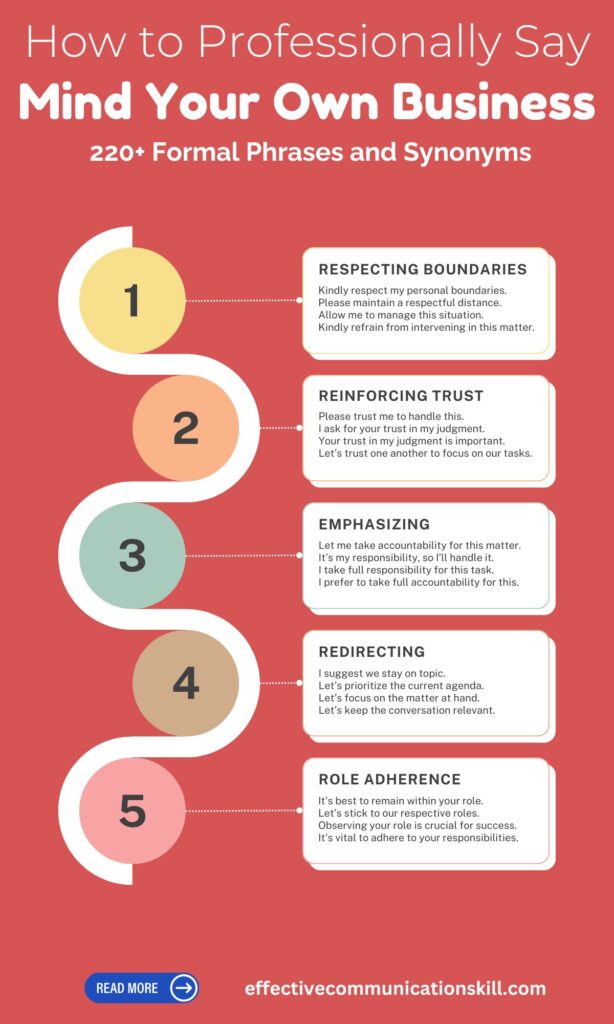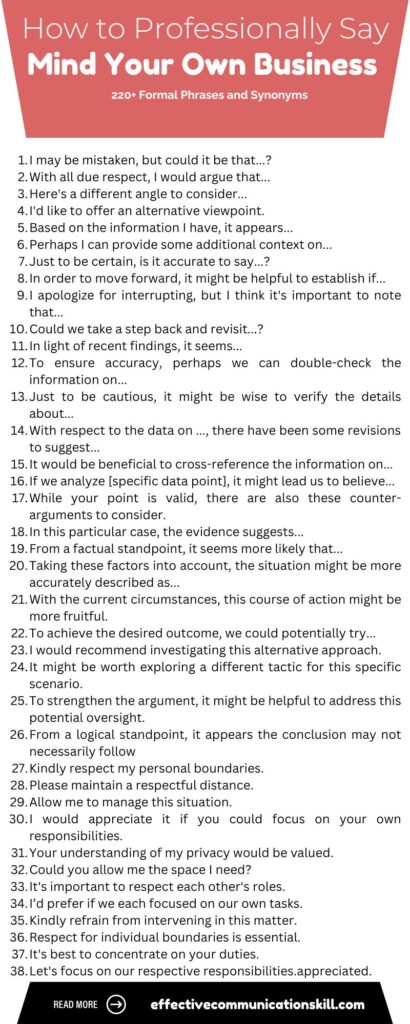How to Professionally Say Mind Your Own Business
In the bustling world of professional environments, setting boundaries is crucial yet often delicate. Whether you’re dealing with an overzealous colleague or a persistent inquiry that veers into personal territory, navigating these situations with diplomacy can be a fine art.
Imagine being able to address these interruptions smoothly without creating tension or appearing unapproachable. The secret lies in mastering the language of professionalism and courtesy.
How to Say Sounds Good Professionally – Understanding how to professionally mind your own business provides you with the tools to maintain control over your personal and professional space while fostering a respectful work atmosphere.
This approach not only keeps interactions smooth but also ensures that your boundaries are respected, enhancing overall workplace harmony.

How to Professionally Say Mind Your Own Business
Navigating the need to assert boundaries while maintaining professionalism can be tricky. These helpful tips will guide you to say mind your own business politely without causing offense or discomfort.
Redirect the Conversation
Sometimes, the best way to handle unwanted questions or interference is by redirecting the conversation. This approach allows you to shift focus without being confrontational.
Example: Imagine a colleague frequently asks about your personal projects. You might say, “I appreciate your interest, but I’m currently focused on a specific project at work. Let’s discuss how we can collaborate on the upcoming team meeting instead.”
Use Positive Reinforcement
Addressing the behavior with a positive spin can help communicate your message without creating animosity. This technique involves acknowledging the person’s concern while steering the conversation back to appropriate topics.
Example: If a coworker frequently inquires about your work habits, you could respond with, “I value your enthusiasm for team productivity. I’ve got my workflow organized, but if you have ideas about the team’s approach, I’m open to discussing them.”
Set Boundaries Clearly but Politely
Clear boundaries are essential in professional settings. Communicate your limits directly but in a respectful manner to avoid misunderstandings.
Example: When a team member keeps asking about your vacation plans, you might say, “I prefer to keep my personal travel plans private. However, if there’s anything you need to know for work-related reasons, feel free to ask.”
Offer Alternative Solutions
When faced with questions or interference that you find intrusive, suggest alternative ways the person can obtain the information they need or contribute to the situation.
Example: If a colleague frequently questions your decisions, you might say, “I understand you’re keen on understanding the project’s direction. Perhaps we can schedule a brief meeting where I can share an overview of our strategy with you.”
Encourage Professional Focus
Sometimes, refocusing the discussion on professional objectives can help deflect personal inquiries. This strategy involves guiding the conversation back to work-related topics.
Example: If someone is overly curious about your personal life, you could say, “I find it’s best to concentrate on our current project to ensure we meet our deadlines. Let’s keep our focus on delivering great results for the team.”
25 Polite Synonyms for Mind Your Own Business
Expanding your vocabulary can enhance your ability to address boundary issues gracefully. These 25 formal synonyms to say mind your own business provide various ways to convey your message while preserving respect and professionalism.
- Respect my personal boundaries.
- Kindly, focus on your own tasks.
- Please respect my privacy.
- Attend to your responsibilities.
- Please, Allow me my space.
- Let me handle this matter.
- Concentrate on your duties.
- Kindly stay within your role.
- Trust me with this.
- Respectfully, Keep to your own affairs.
- Focus on your own concerns.
- Kindly Maintain professionalism.
- Let me manage this.
- Consider your own priorities.
- Please Stay within your scope.
- Please respect my focus.
- Leave this to me.
- Allow me to take charge.
- Address your own tasks.
- Remain focused on your work.
- Let me address this.
- Handle your own responsibilities.
- Trust me to handle this.
- Give me space to work.
- Allow me my autonomy.
200 Other ways to Say Mind Your Own Business Professionally
This extensive list of 200 formal phrases to say mind your own business equips you with versatile tools for maintaining professional boundaries effectively in various situations.
Respecting Boundaries
- Kindly respect my personal boundaries.
- Please maintain a respectful distance.
- Allow me to manage this situation.
- I would appreciate it if you could focus on your own responsibilities.
- Your understanding of my privacy would be valued.
- Could you allow me the space I need?
- It’s important to respect each other’s roles.
- I’d prefer if we each focused on our own tasks.
- Kindly refrain from intervening in this matter.
- Respect for individual boundaries is essential.
Encouraging Focus on Own Tasks
- It’s best to concentrate on your duties.
- Let’s focus on our respective responsibilities.
- Your attention to your own tasks would be appreciated.
- Please concentrate on your assigned work.
- Focusing on your responsibilities will be most beneficial.
- It’s advisable to stick to your own assignments.
- Prioritizing your tasks will be more effective.
- Attention to your work is most appropriate.
- Your focus should remain on your tasks.
- Concentrating on your role will ensure efficiency.
Maintaining Professional Distance
- Maintaining professional boundaries is crucial.
- It’s important to stay within your scope.
- Keeping a professional distance is necessary.
- Remaining focused on your tasks will be best.
- A professional distance should be observed.
- It’s advisable to stay within your role.
- Let’s maintain a clear separation of duties.
- It’s essential to respect the boundaries of our roles.
- Let’s adhere to our respective responsibilities.
- Preserving our professional roles is important.
Politely Asserting Privacy
- I value my privacy and ask that you respect it.
- My privacy is something I’d like to maintain.
- Please respect the privacy of my work.
- It’s important for me to maintain my privacy.
- I’d prefer to keep my matters private.
- My preference is to handle this privately.
- Your respect for my privacy is appreciated.
- My privacy should be respected in this instance.
- I need to maintain my privacy on this matter.
- Privacy is important to me in this situation.
Delegating Responsibility
- Let me take responsibility for this.
- It’s my responsibility to manage this.
- I’ll handle this, thank you.
- Leave this matter to me, please.
- I’ll take care of this situation.
- Let me address this issue myself.
- I’ll be responsible for this task.
- Allow me to deal with this.
- It’s best if I manage this.
- I’ll manage this on my own.
Suggesting Independence
- I prefer to handle this independently.
- I’d like to work on this alone.
- Allow me to approach this independently.
- Independence in this task is necessary for me.
- I’d like to manage this independently.
- Let me work through this on my own.
- Independence is key for me in this matter.
- I need to approach this independently.
- This is something I’d like to handle on my own.
- Independence in handling this is important to me.
Redirecting the Conversation
- Let’s focus on the matter at hand.
- Shall we concentrate on the key points?
- Let’s redirect our attention to relevant issues.
- Let’s discuss the pertinent details instead.
- I suggest we stay on topic.
- Let’s prioritize the current agenda.
- Let’s focus our discussion on the main issues.
- Shall we return to our primary objectives?
- Let’s keep the conversation relevant.
- Let’s address the important matters at hand.
Encouraging Self-Management
- You might want to focus on managing your tasks.
- Perhaps it’s best to concentrate on your responsibilities.
- You may wish to focus on your projects.
- Consider managing your own workload.
- It’s advisable to concentrate on your own assignments.
- You could focus on your responsibilities.
- Consider prioritizing your own work.
- It may be beneficial to manage your tasks.
- You might find it useful to concentrate on your work.
- It would be helpful to manage your own duties.
Suggesting Role Adherence
- Please stick to your designated role.
- Adhering to your role would be appreciated.
- It’s best to remain within your role.
- Let’s stick to our respective roles.
- Staying within your role ensures efficiency.
- It’s important to respect each other’s roles.
- Sticking to your role will help maintain order.
- Observing your role is crucial for success.
- It’s vital to adhere to your responsibilities.
- Let’s focus on our roles to achieve our goals.

Promoting Autonomy
- It’s best if I take care of this independently.
- I’d appreciate the opportunity to handle this myself.
- Let me manage this on my own terms.
- Allow me the autonomy to address this issue.
- I prefer to work through this by myself.
- Please allow me the freedom to manage this.
- Let’s ensure that each of us operates independently.
- I’m confident in handling this alone.
- It would be helpful if I could address this independently.
- Autonomy in managing this is important to me.
Reinforcing Professional Etiquette
- Let’s adhere to proper professional etiquette.
- Maintaining professionalism is key in this situation.
- Let’s follow the appropriate professional protocols.
- Professional decorum requires us to stay within our roles.
- Professional conduct dictates that we focus on our tasks.
- It’s important to observe professional boundaries.
- Let’s maintain a high standard of professional behavior.
- Respecting professional norms is essential here.
- Professionalism requires a focus on our own duties.
- Observing professional etiquette will benefit everyone.
Reinforcing Trust
- Please trust me to handle this.
- I ask for your trust in my judgment.
- It’s important that we trust each other’s abilities.
- I trust you to manage your responsibilities, and I’ll manage mine.
- Let’s have mutual trust in our respective roles.
- Trust in my ability to handle this would be appreciated.
- Your trust in my judgment is important.
- Let’s trust one another to focus on our tasks.
- Trusting each other’s roles will lead to better outcomes.
- Let’s trust each other’s expertise in our areas.
Supporting Efficiency
- Efficiency is key, so let’s focus on our tasks.
- To maintain efficiency, let’s stick to our roles.
- Efficiency will improve if we each focus on our own duties.
- Let’s work efficiently by concentrating on our responsibilities.
- Staying focused on our tasks will ensure efficiency.
- Efficiency demands that we respect each other’s roles.
- Let’s aim for efficiency by handling our own tasks.
- Efficiency is maintained by focusing on our responsibilities.
- To stay efficient, let’s manage our own tasks.
- Efficiency improves when we each stay in our roles.
Emphasizing Accountability
- I’m accountable for this task, so I’ll handle it.
- Please allow me to take accountability for this.
- I’ll be responsible for the outcome, so I’ll manage it.
- Let me take accountability for this matter.
- It’s my responsibility, so I’ll handle it.
- Accountability is important to me; I’ll manage this.
- I prefer to take full accountability for this.
- I’ll ensure accountability by managing this myself.
- I take full responsibility for this task.
- Let’s each be accountable for our own duties.
Reinforcing Personal Boundaries
- I need to maintain my personal boundaries.
- Please respect my boundaries in this matter.
- It’s important for me to uphold my personal space.
- Let’s respect each other’s personal boundaries.
- My boundaries are important, so I’d like to handle this.
- Boundaries help maintain a respectful work environment.
- I prefer to maintain my boundaries here.
- Let’s ensure that personal boundaries are respected.
- I value my personal boundaries in this situation.
- Let’s maintain clear personal boundaries.
Encouraging Respectful Dialogue
- Let’s have a respectful conversation about our roles.
- I value respectful dialogue, so let’s discuss this professionally.
- Let’s approach this conversation with respect for each other’s roles.
- It’s important to maintain respect in our discussions.
- A respectful approach will benefit our conversation.
- Let’s ensure our dialogue is respectful and professional.
- Respectful communication is key in this matter.
- Let’s discuss this with mutual respect.
- Respect in our conversation will help us stay focused.
- Let’s keep our dialogue professional and respectful.
Encouraging Individual Focus
- Let’s each stay focused on our own tasks.
- It’s important to focus on our individual responsibilities.
- Let’s concentrate on our respective duties.
- Focusing on our own tasks will be most effective.
- Individual focus is crucial for our success.
- Staying focused on our roles will ensure productivity.
- Let’s ensure we’re all focused on our tasks.
- It’s best to maintain individual focus in our work.
- Let’s each stay focused on what we’re responsible for.
- Focus on your own tasks will lead to better outcomes.
Promoting Respect for Roles
- Let’s respect each other’s roles and responsibilities.
- Role clarity is essential, so let’s stick to our duties.
- Respecting roles will help us work together effectively.
- Each of us has a role to play, so let’s respect that.
- Respect for roles will ensure a smooth workflow.
- Let’s ensure that we respect the boundaries of our roles.
- Respecting our roles will help us achieve our goals.
- It’s important to acknowledge and respect each other’s roles.
- Let’s work together by respecting our roles.
- Respect for roles is crucial for team success.
Reinforcing Professional Integrity
- Let’s maintain our professional integrity by respecting boundaries.
- Professional integrity demands that we focus on our responsibilities.
- Integrity in our roles will lead to better outcomes.
- Professional integrity requires us to stay within our roles.
- Integrity is maintained by focusing on our tasks.
- Let’s uphold our professional integrity by managing our own work.
- Integrity in our work requires respecting each other’s roles.
- Maintaining integrity means focusing on our own duties.
- Professional integrity should guide our actions.
- Let’s ensure we act with integrity by respecting our roles.
Encouraging Role Clarity
- Let’s ensure clarity by sticking to our roles.
- Role clarity is essential for team efficiency.
- It’s important to maintain clarity in our responsibilities.
- Let’s avoid confusion by respecting our defined roles.
- Clarity in our roles will lead to better collaboration.
- Sticking to our roles ensures clear communication.
- Let’s clarify our responsibilities to avoid overlap.
- Role clarity helps us work more effectively.
- Clear roles prevent misunderstandings and inefficiency.
- Let’s maintain clarity by adhering to our specific roles.
Examples Using Formal Synonyms for “Mind Your Own Business”
Here are some examples demonstrating how to use the previously mentioned formal synonyms and phrases in various professional scenarios:
Maintaining Personal Boundaries:
Scenario: A colleague repeatedly asks about your weekend plans, which you prefer to keep private.
Formal Response: “I appreciate your interest in my weekend, but I prefer to keep my personal time private. I hope you understand that I like to keep a clear separation between my work and personal life. Thank you for respecting that.”
Encouraging Focus on Assigned Tasks:
Scenario: During a team meeting, a co-worker begins questioning the details of a project that you are solely responsible for, despite it not being on the agenda.
Formal Response: “Thank you for your curiosity about the project. To keep our meeting on track, let’s each focus on our current tasks, and I’ll provide a comprehensive update during our next project review. This way, we can ensure that everyone stays aligned with their responsibilities and deadlines.”
Reinforcing Role Clarity:
Scenario: A team member offers unsolicited advice on a task that falls outside their scope of responsibilities.
Formal Response: “I appreciate your input. To maintain clarity in our roles, I’ll continue to handle this task as planned, but I’m open to your feedback once I’ve completed it. It’s important that we each stay focused on our designated roles to avoid any overlap or confusion.”
Redirecting Unnecessary Questions:
Scenario: A colleague keeps asking about the progress of a sensitive project that they are not involved in.
Formal Response: “I understand your curiosity regarding the project. However, this is something I’m handling independently. I’ll share relevant updates with the team when appropriate. It’s crucial that we respect confidentiality and focus on our respective responsibilities.”
Maintaining Professional Distance:
Scenario: A client asks for details on a strategy that are not relevant to their specific needs.
Formal Response: “I can see why that information might be interesting. However, let’s focus on the aspects that directly impact your objectives to ensure we meet your needs effectively. This way, we can keep our discussions productive and relevant to your goals.”
Encouraging Autonomy:
Scenario: During a joint task, a colleague frequently checks in on your progress, creating a sense of micromanagement.
Formal Response: “I appreciate your diligence in ensuring everything runs smoothly. However, I’m confident in handling this task independently and will reach out if I need support. Trusting each other’s expertise is essential for a collaborative and efficient work environment.”
Reinforcing Professional Etiquette:
Scenario: In a collaborative setting, a co-worker begins commenting on personal matters unrelated to the work at hand.
Formal Response: “While I appreciate your thoughts, it’s best that we maintain professional boundaries to keep our focus on the project goals. This will help us stay on track and avoid any distractions that could affect our productivity.”
Promoting Efficiency:
Scenario: A team member attempts to contribute to a project area where they have little expertise, potentially slowing down the process.
Formal Response: “Thank you for your willingness to help. To ensure we maintain efficiency, I’ll continue to manage this aspect, and your assistance would be most beneficial in your designated area. Let’s leverage each other’s strengths where they’re most effective.”
Reinforcing Accountability:
Scenario: A colleague insists on getting involved in a task for which you are responsible, despite it not being necessary.
Formal Response: “I appreciate your offer to assist, but I’m fully accountable for this task. I’ll take full responsibility for its completion and will seek help if required. It’s important for us to trust each other’s capabilities and respect our individual responsibilities.”
Maintaining Role Integrity:
Scenario: During a project discussion, a colleague begins to take over tasks assigned to you without prior agreement.
Formal Response: “I value your enthusiasm in contributing. However, it’s important that we respect our assigned roles to maintain the integrity of our work structure. By each of us sticking to our specific duties, we can ensure that everything runs smoothly and efficiently.”

Conclusion
Knowing how to professionally say mind your own business is an essential skill for maintaining respect and clarity in any professional environment. By using tactful language, you can set boundaries without offending others, ensuring that everyone remains focused on their roles and responsibilities.
Whether you’re reinforcing role clarity, maintaining personal boundaries, or encouraging autonomy, these phrases provide a respectful way to navigate potentially awkward situations. Mastering this approach not only fosters a more productive workplace but also strengthens professional relationships by promoting mutual respect and understanding.
